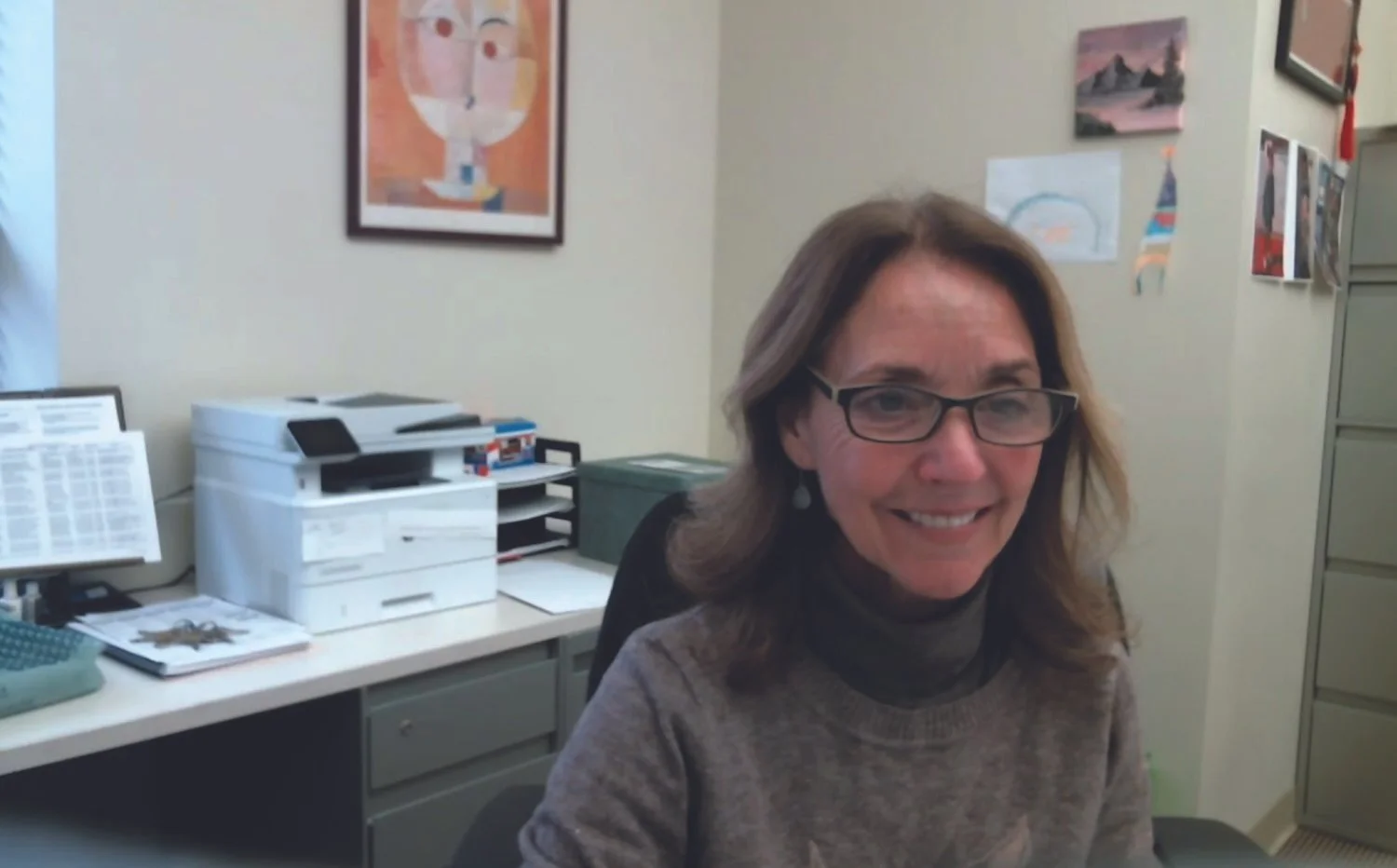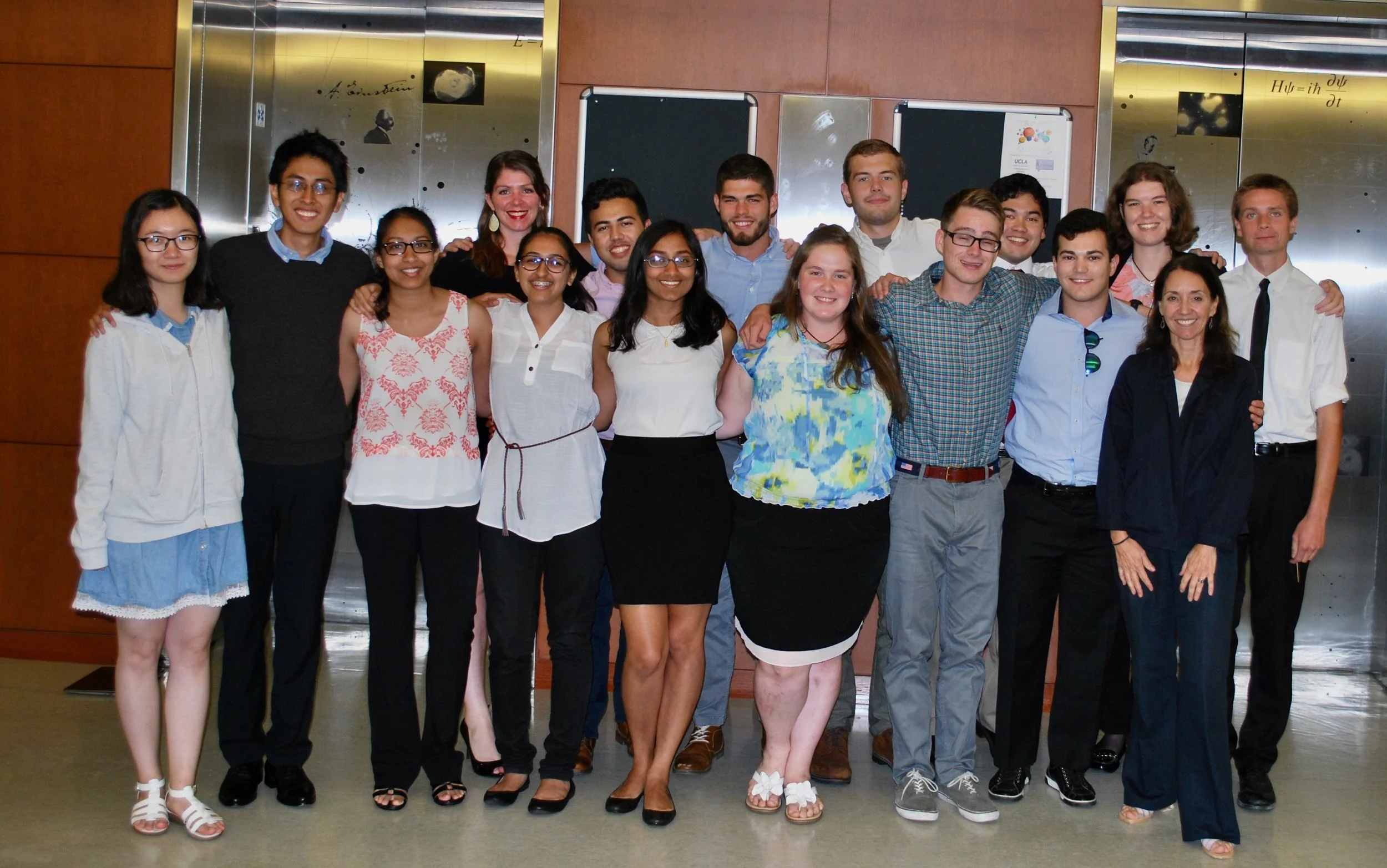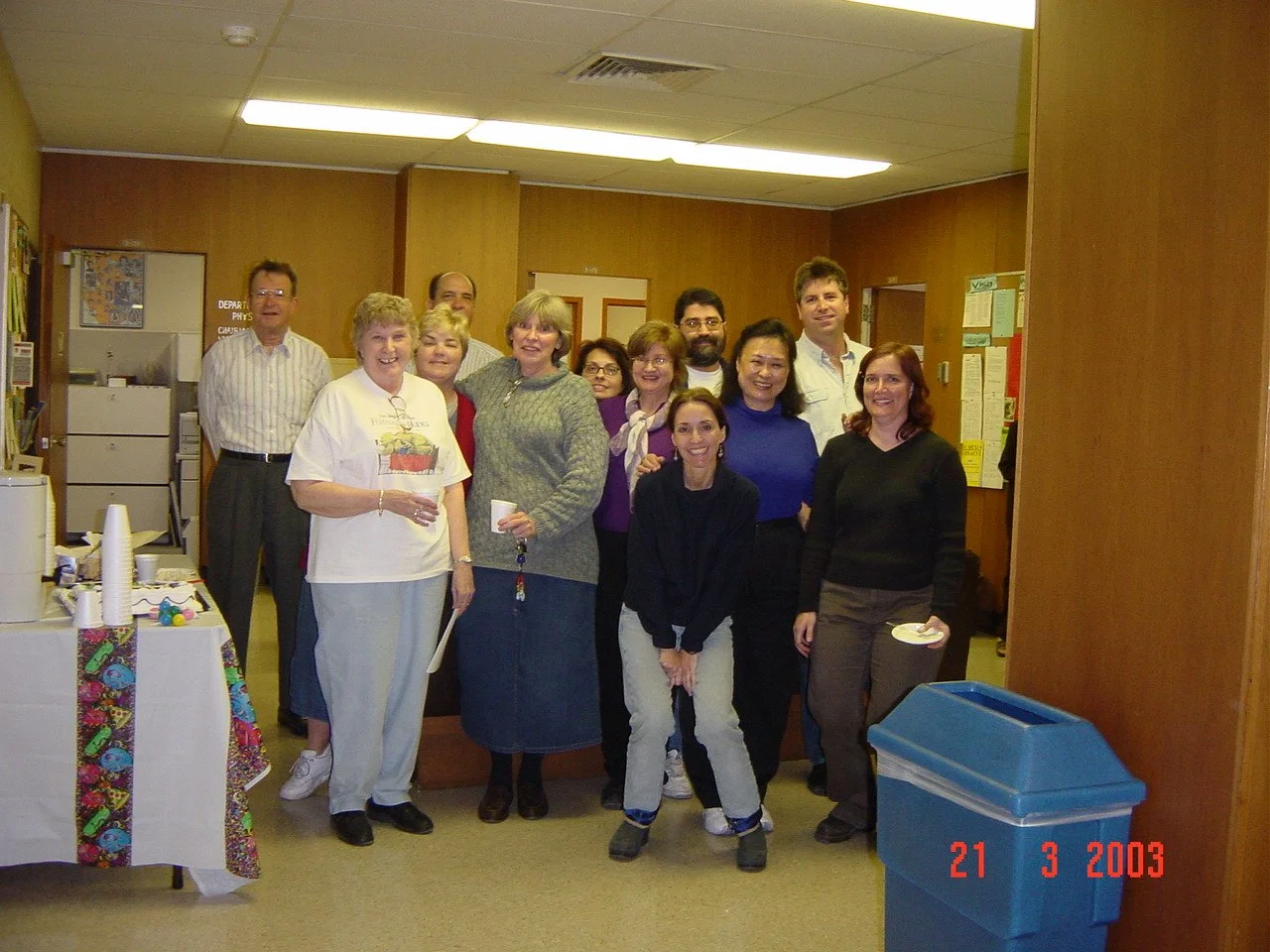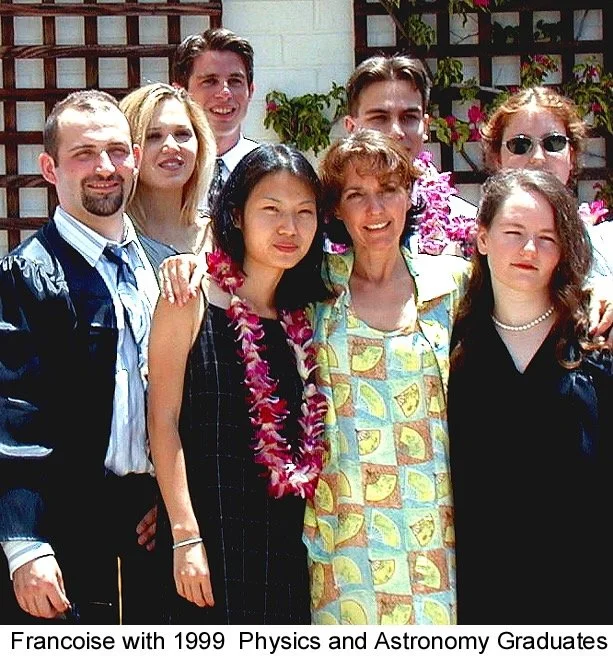Guiding Stars: Celebrating Francoise Queval’s Legacy at UCLA
Interview by Stuart Brown, Chair of Department of Physics & Astronomy
Francoise, you have been a guiding light in the department for more than three decades, always here to welcome, advise, and counsel our undergraduate students. I, personally, cannot overstate how much I valued your advice and input over the years, on everything from discussions on the well-being of individual students to decisions about our curriculum. The department is a much better place with you among us. It saddens many of us that it has come to an end.
Today I am proud to have the opportunity to invite you to share some of the reflections you may have on your time here. And it is a chance for you to offer us just a little more advice.
Let’s get to it.
Q. Would you share with us the changes in the approach to learning, and life in general, in our undergraduate students over the years?
On my first day, which was November 16, 1992, what I was asked to do in my role as undergraduate counselor was to create a supportive environment for the undergraduate students. I think there was a sense in which the undergraduate students were for the most part invisible and the department wanted to change that. Of course, the number of physics majors at that time was not as high as it is today, by far. There was also no space for them to congregate in the department thus less opportunity for interaction and camaraderie. There was also no mandate for the staff or anyone to be particularly supportive of the undergraduate students. Indeed, there were signs posted in some people’s offices explicitly saying “No undergraduate questions allowed” and even in the student lounge, there was a big sign saying “No undergraduate students allowed”. To the department’s credit, I was hired to change that and improve the environment for the majors. Of course, the first thing I did was to remove these unwelcoming signs and I also insisted that the undergraduate students be allowed in the student lounge. Slowly and surely, the undergraduate students came to see that lounge as a place where they could work together. The other thing I did right away was to arrange for every physics student to have an email account (this was before Bruin Online) so I could communicate with them. These changes helped solidify our undergraduate community and they became, as a result, much more of a presence in the department. I also contacted all newly admitted physics majors entering UCLA and invited them to an Open House the day before instruction started in the Fall. I will always remember that first Open House when the faculty who had been asked to address the new students reacted with surprise when they saw the sea of students' faces. They had never seen so many physics majors in one place outside of their classroom. The Open House, the student lounge, has been a tradition ever since.
One of the things that has changed dramatically since I first arrived and which has changed the character of the department has been the huge increase in the undergraduate student population. During the 1990’s, we typically graduated 20-30 students a year in contrast to the last few years where our graduation sees about 120-130 students on the graduation ceremony stage.
Another change that has occurred during my tenure in the department is the fact that our students are typically much more interested in pursuing graduate studies in physics or astrophysics or biophysics. It was not the case during the 1990’s and early 2000’s as students were largely attracted to the burgeoning dot-com industries. The research component of the education has also become an essential part of any student’s dossier both for pursuing graduate studies or for finding a position in industry. I should mention that having to find a research opportunity has raised student anxiety somewhat as unlike signing up for a class, students have to be much more proactive in seeking that opportunity. First, they have to decide what area of physics interests them and then they have to go outside of their comfort zone and try to coax a faculty member to take them on.
Not only has the number of students has grown but the majors have become more diversified in terms of gender and ethnicity. The students are also much more attuned to societal influences and constraints. They are much more organized in their efforts to overcome some of the negative aspects of these influences. This is clearly seen in the emergence of the many recently forms groups/clubs, such as the Women in the Physical Sciences and the Science Laboratory Teaching Club — which takes physics on the road to underserved elementary schools. There is a mentoring club for transfer students, and the graduate organization Marginalized Identities in Physics and Astronomy coordinates a mentoring program for undergraduates from underrepresented backgrounds.
Q. Many of us have long appreciated how much time you spend with individual undergraduate students in your office. Can you tell us a little about those interactions?
I really enjoy the college age group. College students come in steeped in the pressures and expectations heaped upon them by their parents and their prior communities and discover that there are many different ways of looking at the world than what they were raised with. I have taken great satisfaction in trying to be that helpful guide and seeing what a difference it makes for the students when someone makes a concerted effort to understand them and can offer advice about how to cope with the questions they are facing not just in physics but in life in general. There is no greater reward for a counselor but to see the positive changes in the budding young students who come in bright eyed and bushy tails and leave us with a much stronger sense of self and a good reservoir of confidence. What has kept me in this position so long is the joy/reward of seeing the students succeed in conquering the college years. Mastering physics is a great accomplishment!
Q. And what about faculty—how do they approach their students, and their students’ learning then and now?
Our faculty have tended to respond well to the evolving culture of the learning environment in Higher Education. Today, in the classroom, our faculty strive to make learning more engaging, interactive, and relevant to students. More and more faculty are cognizant of, and creative in, the use of modern teaching techniques and use very effective instructional methods to try and help the students break through the very abstract nature of some of the physics concepts. They enhance instruction with many additional resources and are much more attuned to the students’ reception and understanding of the material.
Much student learning is not only happening in the classroom, but also in the lab. Undergraduate students working alongside the faculty is now a rich tradition in our department. Faculty provide students with the opportunity to take an active role in their learning and develop the technical skills they will need either in graduate school or in industry by providing the students with projects which they supervise, but the students are expected to work as independently as possible and figure out how to work through the problems they encounter along the way. Mind you, these projects constitute frontier-level research and train the students in the latest computational and theoretical techniques. The amount of learning students gain in research is multidimensional; for example, they learn to read professional research literature and learn to interpret it critically. They learn a host of experimental methodologies such as signal analysis, fabrication of electronic circuitry, optics, plasma diagnostics, data reduction and calibration, the use of large databases, numerical techniques such as Monte Carlo simulation methods or image processing, just to name a few. The research the students engage in adds tremendously to the quality of their undergraduate education.
When the pandemic fell upon us not so long ago, I witnessed how quickly the faculty were able to pivot to offer their courses online. It was practically overnight. It is clear to me that faculty are dedicated to the students they teach and have become much more sensitive to issues of diversity and inclusion.
I credit the faculty for helping students become functional scientists and citizens of the 21st century. The students who are emerging from our departmental majors are outstanding, incredibly capable and remarkably knowledgeable and this is in large part due to our faculty. The plateau our students reach by the time they graduate creates a fantastic framework for the learning they have yet to accomplish.
Q. I am sure there are a number of activities you engaged in that were particularly rewarding for you. Would you share with us one or two of them?
My interaction with the students. It is always heartwarming for me to watch them walk across the stage at graduation, knowing the challenges they have overcome and knowing that they have reached one of the critical goals in their life trajectory. I know that UCLA has given them the tools to reach many more and, at that moment, I feel a great sense of pride for them.
Besides the day-to-day interactions with our students, perhaps the most rewarding activity has been the summertime Research Experience for Undergraduates (REU) program. Starting in 2002, the department asked me to write a proposal to the National Science Foundation for funding from their REU program.
The successful proposal started a long reign of 15 years during which the department hosted 12-15 students from all over the country each summer to come to UCLA for an intensive 10-week immersion in research. This REU started my long interaction with NSF as I was called almost every year to read and evaluate REU proposals from other universities. I was chosen to represent the physics REU directorate at a Pan-American Conference where REU directors from all directorates met and addressed REU issues and presented posters in Congress to try and coax our representatives to fund more of these programs. I also was part of the first Executive Leadership Physics REU Committee which involved several efforts at bringing attention to the impact REU programs have on the students who participate in them. This interaction with NSF was extremely rewarding for me as I was involved in physics education at the national level.
Since 2018, I have continued as director of the REU program, but now funded by a mixture of Department support and individual faculty REU supplements from grants. In that time, it has focused exclusively on our UCLA undergraduates (14 in 2018 and 17 in 2019, 12 in 2020 (online), 16 in 2021 (hybrid online and in-person), 17 in 2022 in-person, 19 in 2023. We made the transition to provide this rich opportunity to our in-house students, because of the realization that the sudden increase in the number of majors left many of our students unable to find research opportunities within our department.
Q. What will you miss the most once you retire from your position at UCLA’s Department of Physics & Astronomy?
I will miss the students who are really extraordinary: They are bright, work hard and accomplish a lot during their time in the department. They have really impressed me over the years and I have a lot of respect for them. I will miss the great satisfaction that I have felt seeing the enormous impact education has had on them. Selfishly, with their youthful perspective on life, I will also miss the fact that they have kept me young all these years!
I will miss the faculty for their intelligence and their deep commitment to the students they teach both in the classroom and in their labs and the determination they have to pass on their knowledge to the next generation of scientists. Student affairs is really teamwork between staff and faculty all working for the same goal: doing the best for our students. I will miss our shared commitment to them.
I will miss the departmental staff who also work hard within their different areas to keep the department functioning smoothly. We all depend on each other. We also sometimes take breaks and enjoy each other’s company. I will miss those friendly interactions. I will also miss my colleagues and friends across the campus, some of whom I have known for a very long time.
Finally, I will miss my office. A beautiful, well lit, spacious space where I have encouraged, consoled, cheered, and advised thousands of students. I will miss it all—the whole physics community. It was my community for all these years, a community that has given me so much. I hope to remain a friend to the department for many years to come.
Q. Tell us about big plans for the first couple of months post retirement?
Immediately, after my last day on the job, I will be flying East to see our two grand-daughters for a few days. Then, in July, I will join our son and his family in Paris where we will try to attend some of the Olympic Games activities. I look forward to introducing my grand-sons to French culture. In August, we are planning a trip to South Africa. I think travel will be an important part of my retired life.



![1548_40194457041_7726_n[1].jpeg](https://images.squarespace-cdn.com/content/v1/669590059de9754fb689e2a6/66006c1d-5803-4a0d-ab51-f530abdee35b/1548_40194457041_7726_n%5B1%5D.jpeg)




